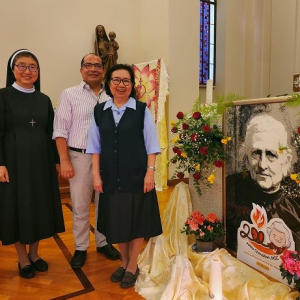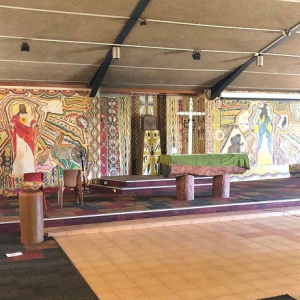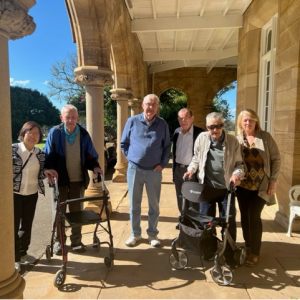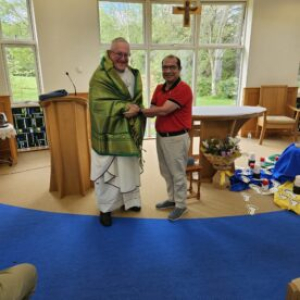Peter MALONE
15th May, a reminder of the Chevalier year, bicentenary of his birth.
15th May, a reminder of the Chevalier year, bicentenary of his birth.
Each 15th of the month has a reminder that we are in the Chevalier year, ending on his 200th birthday, March 15, 2024.
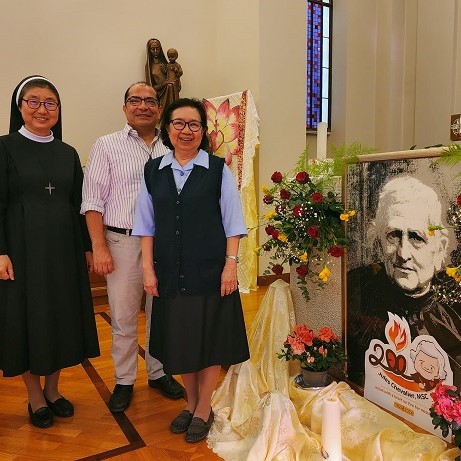
Given his missionary vision, Jules Chevalier would be very happy that his by centenary year was inaugurated by the three Superiors General, MSC, OLSH, MSC sisters, – Bonaventura, Korea; Abzalon, Guatemala; Marife, the Philippines.
His life: When Jules was 17, he entered the minor seminary of Saint-Gaultier (Indre) and shifted without difficulty to the major Seminary of Bourges (Cher) in 1846. He was a serious student, quite strict in his practices of his faith. One day, thanks to an exceptional teacher, he discovered the Heart of Christ. For him it was "like a new vision of God… Bathed in resplendent light and colours… You illuminating his whole life as he was discovering the Heart of Christ. It was the vision and the inspiration of his life and of all his achievement…" (A New Heart, a New Spirit, EJ Cuskelly 24).
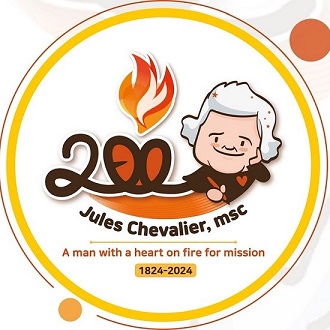
This refreshing revelation of the face of God, came to him providentially at a time when he was worried about the salvation of the world on account of its indifference. Here, he became acutely aware that "while Jesus was on earth, He gladly bestowed all the tenderness of His heart upon the little ones, upon the humble, upon the poor, upon suffering humanity. The site of misery… Touched His heart with compassion" (Meditations, volume 2, 3).
Weekend photos at Wadeye, part I
Weekend photos at Wadeye, part I
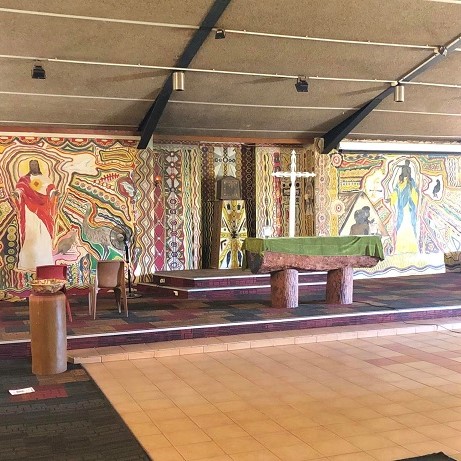
Our continuing parish in the NT, memories of Fr Dick Docherty, Fr John Leary, Br Ted Merritt.
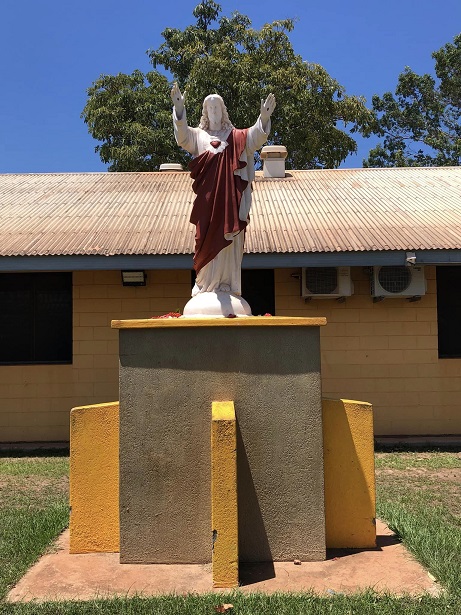
Here are some photos on the religious aspects of Wadeye, parish priest, Leo Wearden MSC,
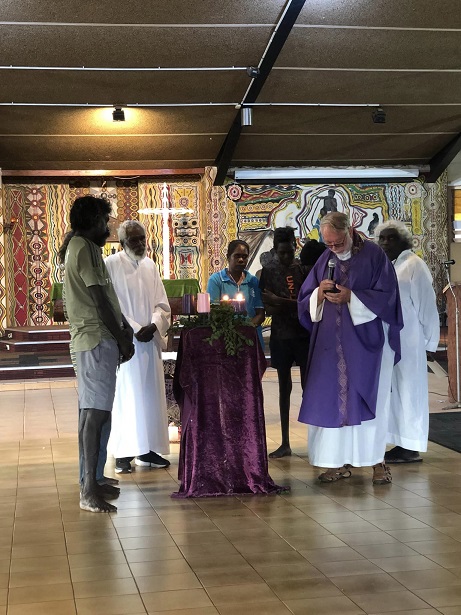
Church,
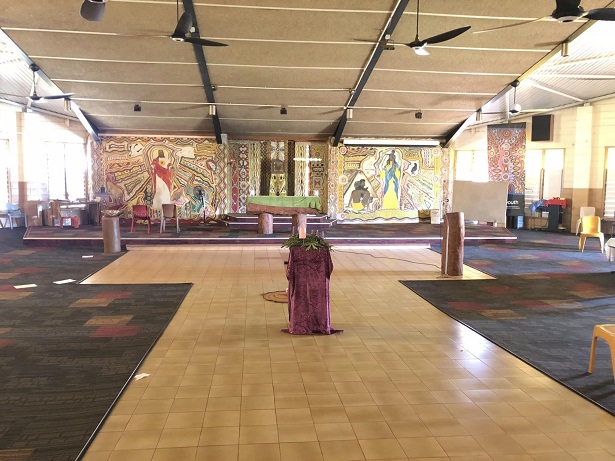
indigenous art and
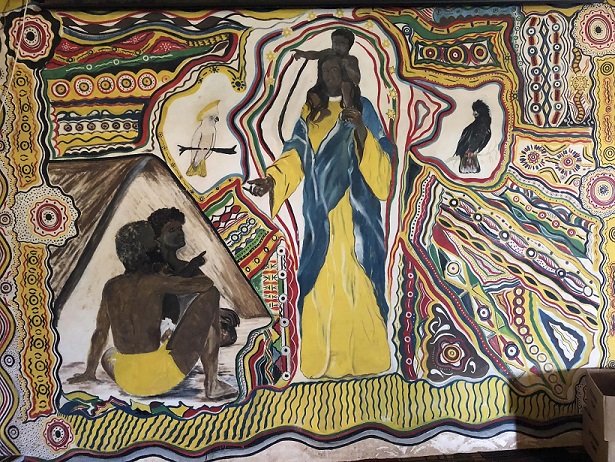
building a crib…
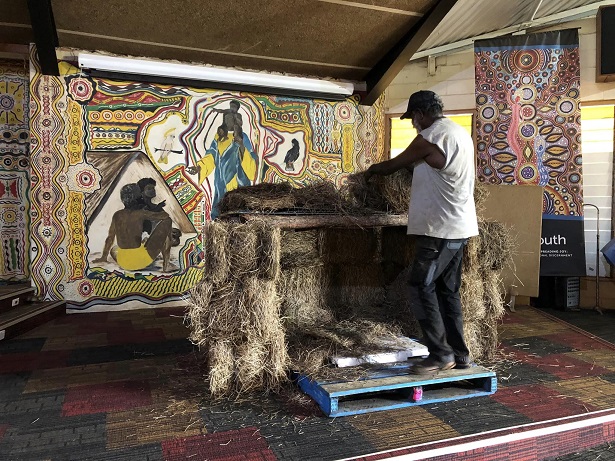
The crib.
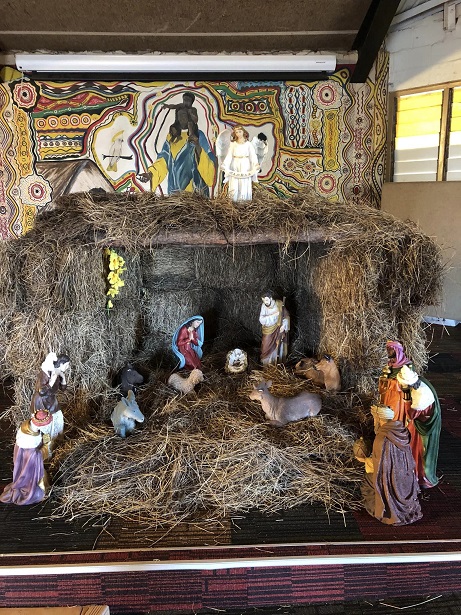
Our students, Trieu and Daniel, spent time at Wadeye last December and took the photos
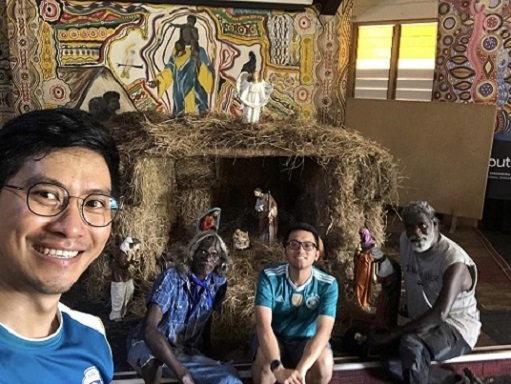
The next time we will have photos out of doors and the graves of our pioneers.
Photos on Friday – around the province
Photos on Friday – around the province
Part of Senior Living, a visit to St Mary’s Towers
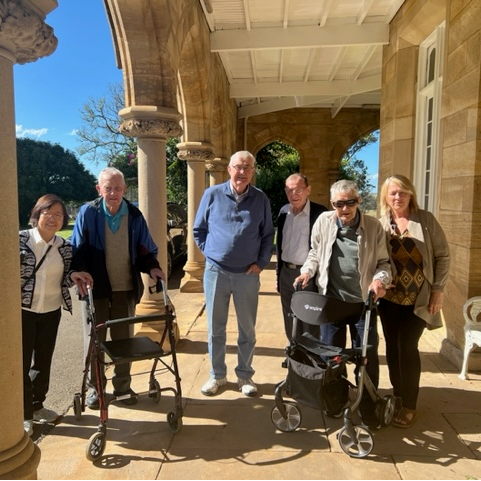
Chevalier Institute at work
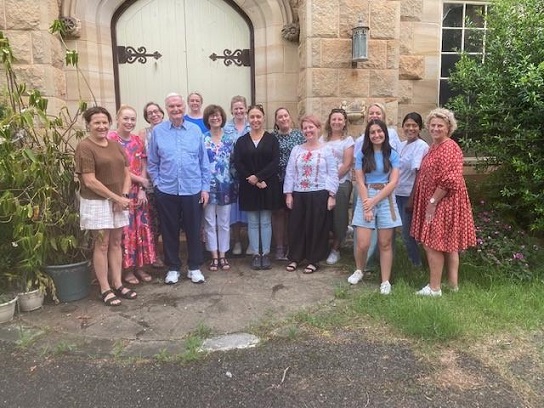
Chapter delegates with Tru and some place in Canberra
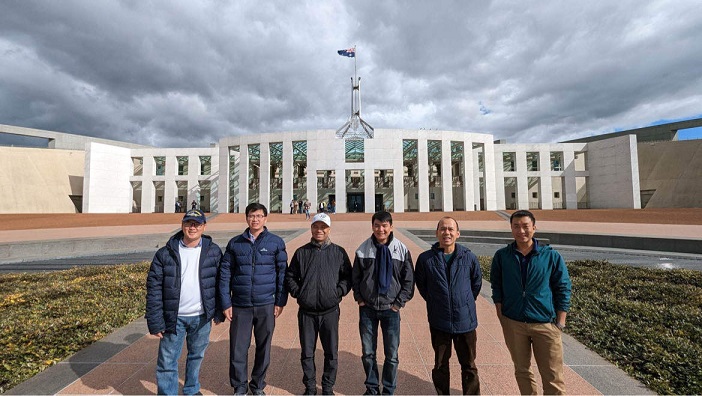
Chapter delegates with Tru and Kimi visit the ACT

Celebrating Terry Herbert (he is there in the photo) and his ministry with Marriage Encounter

Shane Carr was at the Chapter – he left the day it ended, driving directly for ministry in Cunamulla
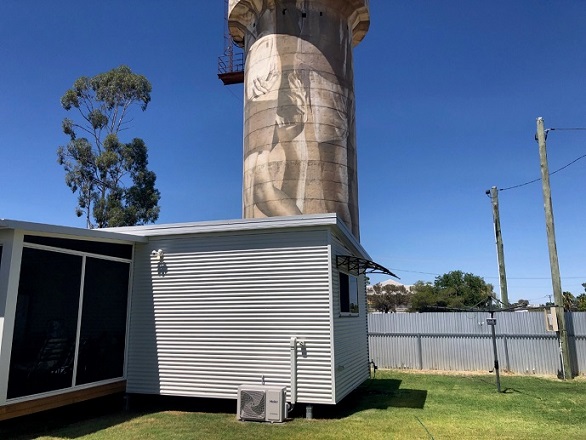
And the parish.
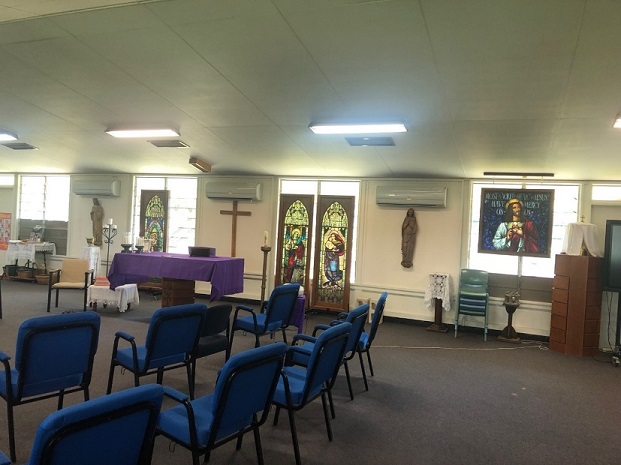
PS The editor of the site liked these photos he took out of his window in Kew the day he left for the Chapter.

You have to be up early to see this sky in the east.

Cairo Conspiracy/ Boy from Heaven
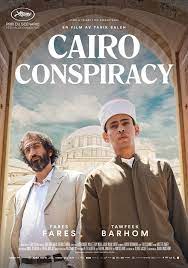
CAIRO CONSPIRACY/BOY FROM HEAVEN
Sweden, 2022, 120 minutes, Colour.
Tawfeek Barhom, Fares Fares, Mohammad Bakri, Makram Khoury, Mehdi Dehbi. Moe Ayoub.
Directed by Tarik Saleh.
This drama, set in Egypt, has been directed by Tarik Saleh, born in Sweden, with an Egyptian father. His young star, Tawfeek Barhom, is Palestinian. His older star, Fares Fares, is Swedish-Lebanese. With its critical perspective on political and religious intrigue, the film was shot in Turkey. Initially, the screenplay (which won the award for Best Screenplay in Cannes 2022) was creative fiction – but, during production, it seemed to echo aspects of power struggles in contemporary Cairo during the presidency of Abdul Fattah Al Sisi.
The original title of the film is Boy from Heaven. But, to capitalise on box office success (and the film has been successful), the more edgy title, Cairo Conspiracy was chosen. It is useful to look at the film from the differing perspective of each title.
The Boy from Heaven is Adam, a fisherman with his brothers and his father in a remote Egyptian village. His father is strict, ready to punish each of his sons for the fence of one, beatings. He is close to the local Imam, reads, has reflected on Islam, and is awarded a scholarship to the Al Azhar University in Cairo, eager, settling in, meeting the fellow students, attending the classes on Islamic theology, sharia law, a simple and devout man. Al-Azhar is the centre for Sunni Islam and Its Theology. His direction in life seems straightforward.
But then the perspective of Cairo Conspiracy takes over. Adam is befriended by a fellow student, treated suspiciously by another group, is taken out on the town, enjoying dancing at a club, urged to drink. In fact, Adam is being recruited to being a spy for the government. The Grand Imam has died and there is jockeying for his successor, a reputable blind Imam who is arrested and imprisoned. The government has its own candidate.
Into the picture comes the head of security, consulting with government officials, setting in motion a plan for achieving ambitions, relying on Adam’s friendly student as an informer – who is then murdered, Adam watching.
The security colonel, Ibrahim, a complex performance from Fares Fares, sometimes sympathetic, other times exasperated, other times threatening and violent, more and more controlling of Adam who wants to please. He is threatened by the Colonel concerning surgery for his father’s health, becoming more and more entangled with a subversive, Muslim Brotherhood group of students. He also becomes the assistant, contrived by the authorities, to another potential candidate to be Grand Imam, strict in his interpretation of law and morals, but having hidden personal secrets.
To this extent, the film is about a conspiracy to corrupt the Boy from Heaven.
The photography is striking, scenes of Cairo, busy streets and neighbourhoods, but, especially the views of the university itself, the students and the lectures.
This film takes us into an experience of Egyptian culture, the role of Islam and its influence, governments and dictatorship, political power and intrigues, intricacies of conspiracies and Adam becoming a victim, a willing victim, and a puzzle about his future.
- The two titles? The commercial title? The thematic title?
- The writer-director, Egyptian background, Swedish background? Fictitious events, coinciding with reality in Egypt during the 2010s, having to film in Turkey? The film is a fiction – but a commentary on Egypt, politics, religious politics?
- The opening, the village, the sea, fishing, the father and his sons? Home life, severe discipline and beatings? The local Imam, Adam and his religious interests, reading, gaining the scholarship? The response of his family?
- The transition to Cairo, the vistas of the city, the various neighbourhoods, the streets, shops, the club with men only, dancing? The University, its reputation, Sunni Islam, the vast open spaces and courtyards, the towers, the rooms, accommodation? The atmosphere of living in the University?
- The musical score, Egyptian music, songs, chanting?
- Adam’s hopes, the young man, naive, religious, with the other students, some putdowns, the accommodation, the friendly student, urging him to go to the club, his response in the dancing, the drinking? The bond?
- The religious situation, the death of the Grand Imam, speculation about his successor? From a religious perspective, from the University? From a political perspective on the government controlling the Grand Imam? The machinations, conspiracies, interventions, violence, exploitation and lack of scruple? And the various factions, the role of the Muslim Brotherhood?
- The Colonel his personality, his role, the meeting with the political authorities, the plans for the succession, his using students, his spies, informants?
- Adam, his friend, recruiting him, the tower, Adam watching his friend being murdered? The consequences?
- Adam approached by the Colonel, smooth talk, Adam naive, believing, making friends with the Muslim Brotherhood group, insinuating himself, his response, learning to be conspiratorial?
- The Colonel, his hold over Adam, his father’s illness, the promise of surgery, but also the threats? The ambiguities in the role of the Colonel? The meetings, the pretence of winning? The further meetings, direct?
- The various candidates for Grand Imam, the Blind Imam, the Imam instructing the students, genial with his students? The Imam, Adam becoming his assistant, doing his messages, at the shops, the story about the baby, the background story of the Imam, his double standards, his relationship, and the severity of his lectures? Adam and his reporting back to the Colonel?
- The encounters with the Blind Imam, his taking responsibility for the death of the murdered young man, his motivations? The impact for the Colonel and the government?
- The ultimate working out of the conspiracy, the government meetings, their influence, particular individuals, the Colonel and his mission?
- The consequences for Adam, his experience at the University, drawn into the conspiracy, the effect on him as a person, psychological, religious? And his return home?
Thousand Lines, A/ Tausend zeilen
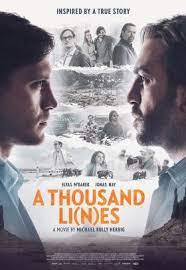
A THOUSAND LINES/ Tausend Zeilen
Germany, 2022, 93 minutes, Colour.
Elyas M'Barak Jonas Nay, Jorg Hartmann, Maria Burchard, Michael Ostrowski, Michael Meertens, Sara Fazilat, Jeff Burrell.
Directed by Michael Herbig.
The German title is very straightforward – the poster for the English title is able to make a sardonic comment that the German title cannot: A Thousand Li(n)es.
With television footage of Donald Trump appearing early in the film, we immediately think of “Fake News”. And, this is a film about the fabrication of news, based on actual characters and events, the prestigious German magazine, Der Spiegel, and a multi-award-winning young journalist. (With an acknowledgement to Wikipedia providing a great deal of information about characters and events, it is worth Googling Claas Relotius to read the background of this fictionalised version and how it keeps quite close to what actually happened.)
Basically this is a drama, a focus on a Spanish-born German journalist for Der Spiegel, Juan Romero, who wrote the book on which this film is based. But, there is some joking in the introduction about this being a fiction, based on fact, but allegedly mostly made up – honestly! This sets a tone that this treatment is sometimes satiric, sometimes a parody, quite funny moments. The film has been criticised by some for its parody tone, the critics wanting a more straightforward, deeper exploration of the journalist creating stories, being hailed for his writing, winning many awards, investigated and exposed.
The journalist of this film, called Lars Bogenius (Jonas Nay) is presented as something of a nice, naive journalist, very active in the field, Syria, US, Mexico… And finding dramatically significant stories which go on to win (as they did in real life) many press awards. Only gradually is the true Lars revealed. But the dramatic focus of attention is on Juan Romero (Elyas M’Barak), a sincere journalist, loving wife, four charming little daughters, who is invited by Bogenius to collaborate in articles, then found wanting, but also determining that there are inconsistencies in Bogenius’s stories, his travelling to Mexico and the US with his photographer to try to find out the truth. And he does, providing evidence.
However, in its satirical way, the film is highly critical of the editors of the magazine, Chronic standing in for Der Speigel, their ambitions, place in the company’s hierarchy, of playing golf, urging journalists to write dramatic articles, articles to get readers emotionally involved. And the satire continues in their fending off the criticism, unwillingness to face the truth, their unmasking even as they condemn Romero.
While there have been many serious films about investigations of journalistic fraud, the satiric tone of this film engages the audience imagination and sense of humour as it exposes the fraud.
- A true story? Based on an actual journalist? His stories? His self-promotion? Awards? And writing for der Spiegel?
- The tone of the film, reporting on actual events, the truth, but the opening and the comment on much of this being fictionalised, honestly? The satiric tone and the parody rather than a serious investigation? Although the investigation was serious?
- The story of Lars Bogenius, enigmatic background, the story of his sister and that being a fiction, his wide travels around the world, the range of stories, especially the civil war in Syria, interviews with athletes? The many articles? His status with the management of the magazine, their promoting him, urging human interest stories more than factual stories, the awards?
- The introduction to Juan, Spanish background, working for Der Spiegel, his reputation, support of his wife, the four little girls, family life? His work for the magazine, reputation, contact from Bogenius, their working together, the research in Mexico, work with his photographer? Bogenius and his complaints, putting down Juan? The authorities?
- The portrait of the management, their ambitions, their perspective on the magazine, the kinds of stories they wanted, promoting bugging years, going to the award ceremony? Juan and his information, then meeting him, condemning him, the rejection? And this coming back to bite them?
- Juan, finding the inconsistencies in the articles, his research, contacting Bogenius? The decision to go to Mexico and America, with his photographer, interviewing the various people, especially the background story in America, interviewing the man in his trailer, the discovery of the truth, others interviewed and their reactions?
- The authorities, not accepting the research, Juan and his being away and the effect on his family, his little girls thinking he did not love them, but the support of his wife?
- The exposure of Berg genius, his background story, the reality of his short visits to locations, his making up the story, the appeal for the children in Syria, exposure?
- The effect of the satirical approach, the comic touches, the serious investigation, and the fact that this was based on actual characters and events?
Book Club: The Next Chapter
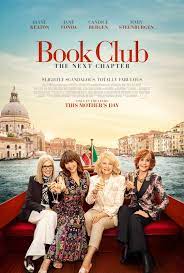
BOOK CLUB: THE NEXT CHAPTER
US, 2023, 103 minutes, Colour.
Diane Keaton, Jane Fonda, Candice Bergen, Mary Steenburgen, Andy Garcia, Craig T.Nelson, Don Johnson, Giancarlo Giannini, Hugh Quarshie.
Directed by Bill Haldeman.
We may not remember the first chapter of Book Club, let alone what the members were reading. However, it didn’t bring together Jane Fonda, Diane Keaton, Candice Bergen, Mary Steenburgen and audiences enjoyed their company. For those who would like to see them again, here we are.
The film opens during lockdown, the four friends trying to deal with the isolation, then prohibitions lifted, and they can come together, big hug!
The added attraction for this film is that it is a trip to Italy, quite a touristic visit to Rome, and equally touristic visit to Venice, and, despite quite some hazards along the way, a wedding in Tuscany. Emphasis on scenery, emphasis on dresses and costumes, emphasis on food and drink (allowing for a car breaking down and a night in a Tuscan jail).
When Diane Keaton put on the hat, boater, for the wedding ceremony, it is like Annie Hall revisited. Candice Bergen, playing a retired judge, with some sardonic comments, reminds us of her Murphy Brown. And, we can say with certainty, Jane Fonda filming this at age 84, has not been harmed in any way by aerobics.
There are some men in the background in the early part of the film, Craig T.Nelson’s husband to Mary Steenburgen, with heart trouble, she overly concerned; there is Andy Garcia, elegantly ageing, partner to Diane Keaton; and there is a very dapper Don Johnson proposing to Jane Fonda. So, for the four friends, what better than a bachelorette party travelling in Italy! (And, for those influenced by the movies and intending to imitate, they seem to be more than financially able to pay for the trip.)
This is definitely a film for a women’s audience, the stars themselves with their long careers, awards, popularity. There is a lot of women’s talk, friends advising each other, some sardonic quips, more than might be expected double entendres, and the audience at the preview session (a smattering of men there) loudly enjoying sharing with the members of Book Club.
As regards a men’s audience? The men in the film are glimpsed early but then arrive for the final fanfare, the wedding and the not-wedding! And, maybe, that’s where the male audience will enjoy the trip.
Interesting to note that of the same time, 80 for Brady was released, very much in the same vein, though the travellers to Houston and the Super Bowl – and with Jane Fonda as the common denominator.
And the advice, as for 80 for Brady, this is a film for older mothers and grandmothers – unless they beat you to it and have seen it already!
- The popularity of the first film? The stars and their impact? Friendship?
- The experience of lockdown, the Zoom communications, the film establishing each of the characters, end of travel bans, reunited, plans, Vivian getting married, the response of the others, Carol losing the restaurant, Sharon retiring, Diane and her relationship with Mitchell? Memories of the plan to go to Italy?
- The decision to go to Italy, the visits to Rome, to Venice, Tuscany, the touristic satisfaction?
- Each of their stories:
Vivian, age, never married, relationships, freedom, her relationship with Arthur, the decision to get married, Arthur being genial, dapper? The adventures on the trip? The buying of the bridal dress? The wedding sequence, not wanting to get married, the vows in the not-marriage?
Diane, the past, with Mitchell, the possibility of marriage, going on the trip, something of a chaperone, the adventures?
Sharon, former judge, sardonic in her comments, enjoying the trip, the encounter with Ousmane, sparring with the chief of police, his turning up, the helicopter to the wedding, his lending her his coat the ceremony, her performing the ceremony?
Carol, the long marriage to Bruce, the family, his illness, taking care of him, over-care, her cooking past, memories of chef Gianni, losing the restaurant, the trip to Italy, her enthusiasm, the restaurant, her meeting Gianni, pounding the dough during the night, phone calls to Bruce? The others and their advice to her to let up on him?
- Men, not seen very much, Mitchell as genial and supportive of Diane, Arthur, patient with Vivian, Bruce and his illness, the golf, the phone calls? Ousmane, his charm, the song and the music, on the canal with Sharon? The police chief, the initial confrontations, the encounter on the lagoon at night, the helicopter, lending his coat? Joni, the genial cook, memories of the past?
- The adventures, the plane, the porters at the airport, losing their luggage, the encounter with the police? Diane and the issue of Harry’s and ashes – and eventually scattering them? The recovery? The shopping for the dresses, in Venice, in the gondola, the police chief and Sharon with Ousmane? The restaurant, Carol in the encounter with Joni? The decision to go to Tuscany, the car, the breakdown, the police chief, suspicions, behind bars? Out, the helicopter, the arrival at the wedding?
- The wedding, the dresses, Arthur and Mitchell present, Carol on the phone with Bruce and his turning up? The quartet and having to start again, the prissy master of ceremonies? Sharon presiding when the priest did not turn up? Vivian not really wanting to marry, Arthur and his declaration? Mitchell and Diane, the wedding?
- The aftermath and audiences wanting to be with the Book Club again?
Keeping up with the Chapters – this time Irish Province.
Keeping up with the Chapters – this time Irish Province.
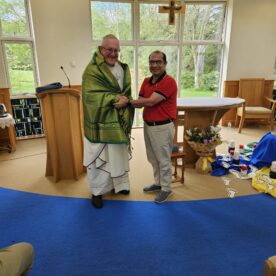
Incoming Provincial, Joe McGee with Abzalon - and a souvenir from India (see below)
40 members of the Irish MSC Province gathered on Sunday evening, 30th April in Mount Saint Anne’s Retreat & Conference Centre, Portarlington, Co. Laois to begin our first ever Open Provincial Chapter.
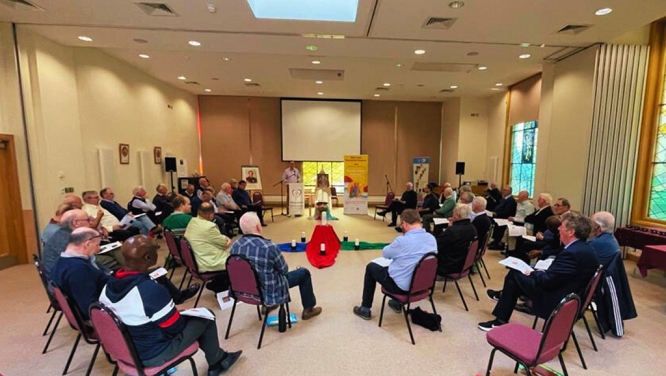
Provincial Fr Carl Tranter MSC, welcomed everyone and expressed his desire that the Chapter be a grace-filled experience for all as they discussed and planed a roadmap for the years ahead for the Province. Fr Carl and Tony Horgan led the Opening Liturgy, welcoming all present and thanked those who had travelled from near and far: from Ireland, England, USA, Southern Africa, Kenya, Venezuela and South Sudan and extended a huge welcome to our Superior General, Fr Absalón Alvarado MSC, who will journey with them for the week of our Chapter. Fr Absalón’s presence will be hugely enriching for everyone. Candles were lit representing the five continents of the congregation and the eight countries they currently have confreres working in. Jimmy Mitchell, as the oldest member of the Chapter, lit the Chapter candle.
During the Opening Liturgy all members of the Chapter declared their presence and desire for the week ahead and the Facilitator ,Frances Heery, Secretary to the Chapter ,Paula Ryan-Kavanagh, Translator ,Jaime Rosique and Scrutineers Giacomo Gelardi, Alan Neville and Peter Ng’ang’a, were prayerfully welcomed and formally approved.
The first day began by introducing the MSC theme through reflection on the Road to Emmaus. Members were invited to share their experience of life in two and fours inspired by the two disciples on the road. This was felt by all present as a profound experience of getting to know each other in a deeper way. The day concluded with Eucharist led by Fr Absalón.
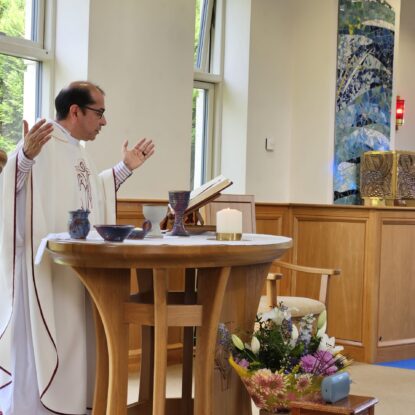
The second day (Tuesday 2nd May) began in a creative way when the Facilitator ,Frances Heery conducted an interview with Carl inviting him to share his experience of being Provincial. The highs, the lows and moments of inspiration were shared by Carl and his honesty was greatly appreciated. Carl’s sharing provided a springboard for group reflection regarding how members experienced the life of the province at the moment.
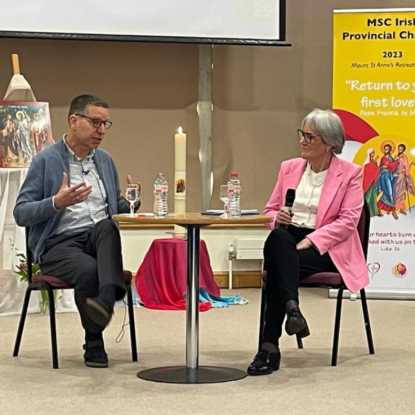
Eucharist was celebrated by three of the confreres from Venezuela, Yonys Mendoza, Eliel Araujo and Deiby Fuenmayor.
On Wednesday 3rd May, Each group presented a guidepost for the Province and work will continue on these in the coming years for the good of the Province. Some of the main themes discussed were, laity, environment, healing past hurts, mapping the future for Venezuela and Southern Africa and the Missions as a whole.
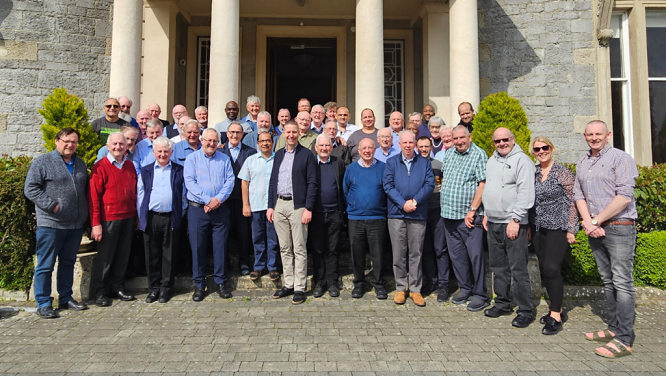
Chapter participants
On Thursday 4th May the first session was dedicated to conversation and sharing on the qualities and characteristics required for the role of Provincial Councillor. Fr David Nixon MSC and Fr Manus Ferry MSC were elected and both accepted their election.
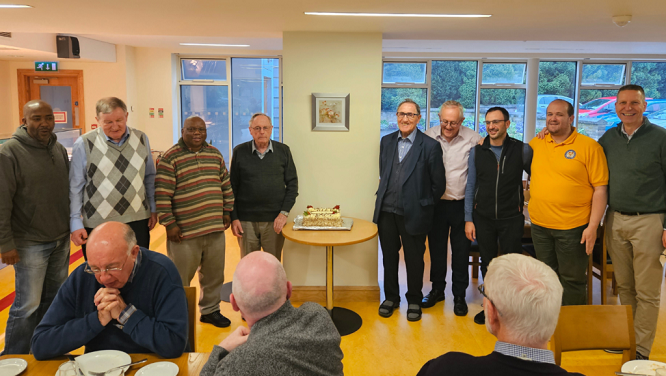
The day continued with an input from our MSC Safeguarding Manager, Ms Mary Tallon.
On Friday 5th May, Provincial, Fr Carl Tranter MSC, gave an update on new formation project being set up in Kenya and a possible new mission with the Indian Union for Ireland/UK. The Chapter indicated their desire to encourage the incoming Provincial Leader Team to explore this option with the Indian Union. Fr John Fitzgerald MSC, Provincial Bursar, and Mrs Mary Kelly, Finance Manager, presented a Finance Report. Election of two Delegates to attend the General Chapter – Fr Julius Katjipa MSC and Fr Carl Tranter MSC’
The final day, Saturday 6th May, involved table conversation on the following question: As you return to your particular Jerusalem, what are you taking back with you from the experience of walking together this past week? This was followed by a time of sharing.
Fr Carl Tranter MSC, Provincial, proposed to the Chapter that Fr Joe McGee MSC take over as Provincial on 1st August 2023. Fr Carl will finish his term as Provincial on 31st July. This was approved unanimously.
The work of the Chapter concluded with final words from Fr Carl. He said it has been a historic week as we had our first ever Open Chapter. It had gathered nearly half of the Province together in conversation and sharing. He is deeply thankful for the sense of brotherhood in their time together which has been strengthened. As we come to the end of the Chapter we are ready for the Return to Jerusalem. We return to our place and hopefully discover something new about it. Return with the fruits of our journey and the desire to continue conversations, to engage deeply and live our MSC commitment and brotherhood more fully. It has been a rich week. Please God we return changed and wishing to grow.
The Chapter concluded with Eucharist led by Fr Joe McGee MSC, Fr David Nixon MSC and Fr Manus Ferry MSC (members of the incoming Provincial Leadership Team).

Fr Absalón MSC presented Fr Carl Tranter MSC,

Fr Joe McGee MSC
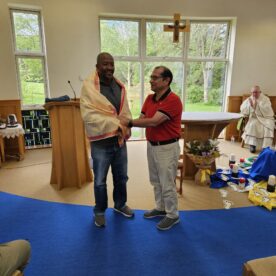
and Fr Peter Ng’ang’a MSC with symbols from India representing hope for the mission ahead.
Fr Carl Tranter MSC as President of the Chapter then blows out the Chapter Candle to conclude the Chapter week.
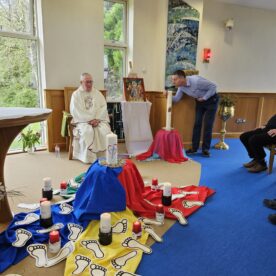
Beau is Afraid
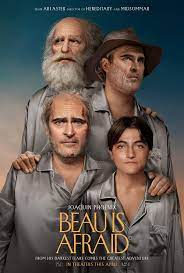
BEAU IS AFRAID
US, 2023, 179 minutes, Colour.
Joaquin Phoenix, Patty LuPone, Amy Ryan, Nathan Lane, Kylie Rogers, Denis Menochet, Parker Posey, Zoe Lister-Jones, Amen Nahapetian, Stephen McKinley Henderson, Richard Kind, Hayley Squires, Bill Hader, Michael Gandolfini, David Mamet.
Directed by Ari Aster.
Beau is afraid – and we, the audience, along with him. And there is a great deal to be afraid of, whether it be in reality or, more probably, in Beau’s tormented mind and imagination.
Writer-director, Ari Aster, made quite an impact with his first two feature films, Hereditary and Midsommer. They were praised as horror films. However, he had already directed a short films including, in 2011, a seven minute film called Beau, the Genesis of this feature film. And, Beau is Afraid, has also been described as horror. But, it is not in the vein of blood and gore (though there is some of that), rather, as publicity describes it, a tragicomedy. How much comedy will the audience find is a moot point. There is more tragedy.
Beau is Afraid is an Odyssey, definitely very Odd. While the writing and the direction are highly imaginative and, frequently, quite unexpected, the film is often something of an endurance to watch, to sit through. And, it runs for three hours. But, it is a credit to Joaquin Phoenix that we keep watching. Phoenix has proven over the decades that he can perform quite a range of characters (even Jesus himself in Mary Magdalene), but winning and Oscar for a performance of quite a different kind of madness in Joker. This performance certainly matches that one.
It does not take long to realise that there is something quite wrong with Beau, his mental condition, paranoia and imagination, living in squalor in a very ugly neighbourhood in a bizarre city, prone to memory loss, his therapist prescribing drugs to be taken with water, then a water failure, Beau’s collapse. Then there is the strange gradual revelation of his relationship with his dominating mother, his dead father. And some flashbacks to some seemingly happy at times.
Significant stops along the Odyssey include being rescued by a sympathetic couple, Grace and Roger (Amy Ryan and Nathan Lane), their suicidal and taunting daughter, their violent assistant, PTSD from war. Another stop is with a travelling theatre troupe, The Orphans of the Forest, welcoming Beau, his watching the rehearsals and imagining himself, his much older self, perhaps a variation on King Lear, trying to find his family.
By this stage of his Odyssey, Beau can hardly distinguish reality from fantasy. And, things deteriorate when he finally arrives home for his mother’s funeral, only to be dominated by her again, weird secrets revealed in the attic about his father, and Beau’s attempt to escape everything only to find that he experiences a kind of Last Judgement on himself, a review of his life, his failures with his mother…
Weird in characters, in narrative, gruelling in terms of sharing Beau’s journey, and no one could accuse Ari Aster of hope.
- The title and expectations? The character of Beau? The nature of his fears?
- The work of the director, background, film career, interest in horror?
- The real and the surreal? How much of Beau’s Odyssey is actual, real? How much a dream? How much nightmare? The blend of the two?
- Joaquin Phoenix’s performance, through the three hours, Beau as an adult, childish and childlike mentality, coping and not coping, fears? And the performance within the play, a kind of King Lear character?
- Introduction to Beau, his age, manner, appearance, mental condition, paranoia? In his apartment, the therapist, the drugs to be taken with water, no water, decision to see his mother, the impact of his mother, the effect of the flashbacks? Packing, sleeping in, the notes and complaints about his loud music? The baggage missing, the key? Late for the airport, phone call to his mother, the news that she had been killed by the chandelier? The spider? Running into the street naked, hit by the food truck?
- The atmosphere of the city, the neighbourhoods, squalor, violence, the odd characters in the street?
- The episode with Grace and Roger, their personalities, looking after Jeeves, their son’s commander, his death? Toni, her place in the house, dislike of Beau? The treatment by Grace and Roger, promising to take him to his mother, the postponements, the surgery, Tony and her reactions, berating Beau, the paint, her drinking it, her death, the reactions of Roger and Grace? Beau fleeing?
- The Orphans of the Forest, the travelling players, their welcoming Beau, the personalities, the welcoming young woman, the rehearsals, Beau imagining himself in the play, searching for his family, separated by the flood? The interaction by Jeeves, the violence, the massacre?
- The flashback to childhood, meeting Elaine, the relationship, promises for the future?
- Mona, her character, business achievement, attitude towards her son, towards her husband?
- Mona, Jewish customs, but her not wanting to be buried until Beau was present, his arrival in the house, meeting Elaine, the past, their stories, the sexual encounter, Beau’s fears about climax, but Elaine’s death, her frozen body? Carried out?
- The madness, Beau and Mona, asking about his father, discovering his twin brother in the attic, the monstrous father? And killing Jeeves?
- The final paranoia, Beau and the motorboat, the cave, the arena, the trial, his mother and the accusations, Dr Cohen, the visualising of Beau’s life, the relationship to his mother, the lawyer, Mona killing him, the buildup to the climax, the explosion, Beau’s drowning? His mother sobbing?
- The audience travelling in this strange Odyssey, how much identifying with Beau, how much puzzled by him, how much was real, how much in his imagination?
Merkel

MERKEL
Germany, 2022, 95 minutes, Colour.
Directed by Eva Weber.
The publicity synopsis for this cinema portrait of Germany’s first woman Chancellor, Angela Merkel, puts it in a nutshell: Driven by extensive archive material and interviews with those who know her, this is the astonishing story of how a triple outsider - a woman, a scientist, and an East German - became the de facto leader of the Free world, told for the first time for an international audience.
The film is described as a biography but a biography that satisfies audiences wanting to know details of the subject’s life but going into depth is not quite possible in 95 minutes cinema. It would be more accurate to call this film a portrait.
During her 16 years leading Germany and considered by many the de facto leader of the European Union, Angela Merkel made a powerful impression, in a leadership, in diplomacy, in guiding Germany and the European Union, often offering a compassionate face to the world, especially in 2015 and the vast number of refugees from the East entering Europe and allowed into Germany.
This portrait offers the opportunity to learn about Angela Merkel’s early years, her growing up in East Germany, her family, her pastor father, her studies and achievement, her science background. Yet, circumscribed by the limits of the borders, the separation of the Berlin Wall (and the film opens with some satiric perspectives, the ranting of Donald Trump about the Mexican border wall a necessity, the shouting of his adoring public, contrasting with the realities of the Berlin Wall and its consequences, Trump highly critical of Merkel).
Which means then that the portrait-building shows the humane side of Merkel. Then, it moves to the political situation, the Chancellor, controversies, Angela Merkel entering politics, the significance of her being a woman from East Germany, the PR aspects of her presence in the Bundestag. The film enters into some detail about her rise, her portfolios, her success – and her somewhat surprising ascendancy as Chancellor.
While the film has a lot of footage of Merkel being interviewed, a sympathetic interviewee, touches of humour, various speeches being made, especially at Harvard and her being honoured, the film does give some kind of insight into how she handled the politics of 2006 to 2021, a female leader on the world stage, her relationships with other world leaders (from Trump to Putin), and her achievement by the end of her Chancellor leadership.
The filmmakers are in admiration of Angela Merkel, positive but presenting critical aspects, and offer an opportunity for audiences to learn something about her and a perspective on her achievement.
Inspection, The

THE INSPECTION
US, 2022, 93 minutes, Colour.
Jeremy Pope, Gabrielle Union, Bokeem Woodbine, Raul Castillo, Nicholas Logan, Eman Esfandi.
Directed by Elegance Bratton.
The title? A military inspection. Specifically, the Marines. And that is no easy inspection.
This is quite an intense film. The audience meets 25 year old Ellis French, living on the street since he was 16, thrown out of home by his religious mother who cannot accept that her son is gay. Dramatically, this is only gradually revealed in the first 20 minutes unless you are alert to this kind of character.
Ellis decides to make something his life – to be a Marine, to be thanked for his service, some kind of heroism.
We’ve seen many films of tough, harsh, often humiliating and bullying training (what about Louis Gossett dominating Richard Gere in An Officer and a Gentleman 40 years ago?). We share French’s being targeted, the humiliation, target bullying, his determination, never to let the trainers win by pulling out. Bokeem Woodbine is harshly convincing as the Gulf War veteran who will subdue the recruits – his assistants relishing their, verbally abusive putdowns, officially smug superiority.
But, this film belongs to Jeremy Pope, nominated for a Golden Globe for this performance. We see him on the streets, bearded, curly headed, visiting his mother to plead for his birth certificate so that he can join the Marines, her rejection of him even as she loves him. Then, beard off, bus to boot camp, head shaved, uniform, lining up, the drill, the accommodation… It is a very strong performance. And, it is matched by the harsh attitudes, the conflict of mother-love, in the performance by Gabrielle Union.
So, perhaps, a standard story of recruits, training, being tested, making good. And a film of the ambiguities of tough marine ethos and its apparent humanity with the Marines ultimately being ready to serve and to die in war.
However, with the revelation that Ellis French is gay, the audience is invited to enter his fantasy in a shower sequence, his being derided by his fellow Marines, the dramatising of homophobia, especially in the Armed Forces, along with issues of race and religion, the persecution of a Muslim Marine, this is a strong drama about the place of a gay man not only in his world but in the armed services.
Ultimately, there is some positive affirmation, some help from a kindly officer who encourages Ellis French.
And, then, the graduation inspection, his mother arriving, proud of her son, his declaring his love for her – then a public outbursts, her inability to accept him as he is even if she states she loves him.
Which means then the film becomes a drama of acceptance and non-acceptance and the consequences.
- The title? Expectations? Military inspection, graduation?
- The 2005 setting, war in Iraq, military in Afghanistan? The need for troops, training, the Marines? The background of the Gulf War? Camps, training, the recruits, the gruelling regime, physical, mentally? Achievement and graduation? The musical score?
- The film and the writer-director and his own experience in the Marines, and his sexual orientation?
- The film as tough viewing, the treatment of the recruits, the details of the physical training, issues of humiliation and the mental effect? Tough viewing about Elvis and his sexual orientation, his relationship with his mother, his life on the street, joining the Marines, the exposure of his orientation and the consequences?
- Ellis French, aged 25, hair and beard, the decision to join the Marines, the visit to his mother, the birth certificate, her rejection of him and is going on the streets since 16? Shaving the beard, volunteering, the bus to the camp, the spirit of the volunteers, arrival, Laws, his manner, philosophy, his assistants and their verbal abuse of the men? The allotment, bunks, the range of routines of military life?
- Ellis, wanting to make something of himself, to be recognised, some kind of a hero, and to be thanked for his service?
- The shower sequence, his imagination, the physical consequences, the reaction of the men? The homophobia in the Marines? The men and the reactions, wary of Ellis? The sympathetic officer, Ellis misinterpreting him? Ellis and his dreams and fantasies?
- The range of training, the weeks passing, Ellis and his determination, the Muslim recruit and the treatment, Ellis defying the authorities by staying and succeeding?
- The character of Laws, his Gulf War background, dedication to the military, his style of command and control, the personal portrait of this kind of Marine officer?
- Ellis and his mother, her treatment of him, motivations, religious, not accepting that he was gay? His invitation to her for the graduation? His dressing up, acceptance by the Marines, the officials, the parade, his looking for his mother, her arrival?
- His pride, her pride, the meal in celebration, the discussion about his orientation, her anger, walking out? His being hurt? Yet being determined?
- Audiences familiar with films about the training of recruits, this film it with that pattern? But the added dimension of sexual orientation, homophobia, self-assertion, being oneself and succeeding?
